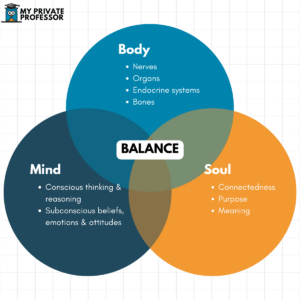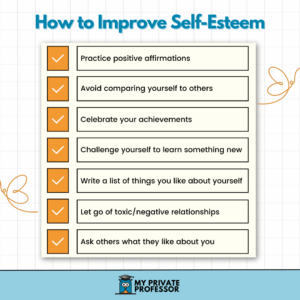The mind-body-soul connection. Is it real? Or just a buzzword-type phrase? While this concept can seem a little arbitrary, it’s a fundamental component of how our lives play out every day.
At any given time, your mental health could be affecting your physical health. Or vice versa. Or your emotional health may impact your mental health. And in turn, this could affect your physical health. At the end of the day, the phrase mind-body-soul just points to the fact that it’s all connected.
Holistic health
Enter: holistic health, an approach to wellness that encourages acknowledging the interconnectedness between the different areas of the whole person. (That is, the physical, mental, emotional, social, intellectual, and spiritual.)
One particular facet of the mind that can significantly affect daily life is self-esteem, which is basically how you feel about yourself based on your opinions and beliefs. But of course, like most things, self-esteem is influenced by external factors such as personality, upbringing, and life experiences.
 For instance, imagine you’re preparing for a major soccer game. Your team is up to win the state championship, and you’re a starting player.
For instance, imagine you’re preparing for a major soccer game. Your team is up to win the state championship, and you’re a starting player.
Practice is going great. But then right before the game, you get the call that you didn’t get into your dream college. You try to compartmentalize your thoughts and focus all your energy on the imminent game. But as soon as you walk onto the field, your mind goes directly to all the ways in which you feel that you failed. And all the work you now have to do. You’re distracted and upset.
So no, you probably aren’t bringing your A-game.
Feelings of anxiety, stress, and depression can majorly impact whatever you’re doing at any given moment. And it’s not just a theory.
Research shows that one of the most common physical symptoms of stress is increased muscle tension. In the case of sports, this is an obvious hindrance to any player’s performance. And plus, once you notice your overly tense muscles, you might certainly be even more distracted than you already were.
You can think of so many instances like the soccer game example above. Essentially, you’re just dealing with holistic health. But more significantly, by understanding how myriad external factors can affect self-esteem, you can learn about the importance of nurturing it regularly.
Self-esteem, stress, and depression
When thinking about holistic health, we can think in terms of mind, body, and spirit. Self-esteem affects these dimensions—particularly, mind and spirit. And as a result (because mental strife can cause physical strife), your body.
As it stands, research suggests that low self-esteem is associated with anxiety, depression, and academic stress.
So what does this have to do with academic performance? Well, think back to what I said about each dimension of your body affecting the other dimensions.
In school, you use your brain a LOT. You use it to memorize facts and dates, to solve equations, and to analyze stories. But your brain can’t simply filter out what it does not want to deal with.
When you have low beliefs/opinions about yourself or your ability (low self-esteem), your mind itself, and the stress-, anxiety-, and/or depression-rooted thoughts, can hinder your academic potential. And so if you don’t take steps to take care of your mental health (and in turn boost your self-esteem), you’re putting yourself at a disadvantage.
The impact of self-esteem on academic performance
Self-esteem is directly related to confidence—and confidence can be a game changer for students. That is, students who may not be performing at a high level, but have high self-esteem, probably have more confidence about their ability to improve. Meanwhile, students who are performing at a high level, but have low self-esteem, might have difficulty progressing.
Furthermore, it’s important to recognize that self-esteem doesn’t work alone. Rather, self-esteem works in conjunction with stress and depression.
Self-esteem, stress, and depression work in conjunction
In order to improve your wellbeing and in turn, academic performance, it’s critical to understand how low self-esteem and stress and depression, together, can impact your academic performance.
Some of the major symptoms of stress and depression include:
- Inability to concentrate
- Fatigue
- Lack of motivation
- Sleep difficulties
Consider the sheer amount of mental focus and physical stamina that you need in school. You do, evidently, need concentration, physical energy, motivation, and enough sleep. So yes, stress and depression can significantly impair academic performance.
When students have less motivation to show up, they may accumulate absences. And chronic absenteeism is linked to risk of falling behind in school or even not graduating.
If students are showing up, but lack focus and motivation, they’ll inevitably retain less information. And this leads to lower academic performance.
Research on self-esteem and academic performance
Indeed, research shows that self-esteem is significantly linked to academic performance.
One study on the relationship between self-esteem, achievement goals, and academic achievement among primary school students found that there was:
A strong, positive relationship between self-esteem and academic achievement
- A strong, positive relationship between approach performance academic achievement
- A strong, negative relationship between avoidance performance and academic achievement

Approach performance is when a student focuses their attention on achieving their goals and presents themselves to others as competition. Meanwhile, avoidance performance is when a student focuses on avoiding failure.
Evidently, a student with high self-esteem is more likely to take on the approach performance, while a student with low self-esteem would probably adopt avoidance performance.
Another study on the relationship between self-esteem and academic achievement amongst pre-university students found that increased self-esteem was positively associated with increased academic achievement.
What can we do?
Parents
- Praise childrens’ achievements
- Provide children with responsibilities
- Encourage children to take healthy risks
- Let children help out around the home
- Encourage children to pursue their interests
- Help children devise goals
Educators
- Teach students how to develop a growth mindset
- Praise students’ accomplishments
- Promote failure as a learning opportunity
- Give constructive (not destructive or harsh) criticism to students
- Celebrate students’ strengths
- Encourage students to embark on independent projects/tasks
Students
- Practice healthy stress-management techniques
- (i.e., meditation, exercise, journaling)
- Practice self-compassion exercises
- Take time to disconnect from social media
- Implement mindfulness into your daily life
Final thoughts
All in all, it’s somewhat comforting to recognize that no one always has perfect self-esteem.
Having a fluctuating self-esteem is seemingly just part of the human experience. So even if, at the current moment, yours may be dwindling, you’ll forever have opportunities to strengthen your self-esteem. And in turn, elevate every other part of your life!







